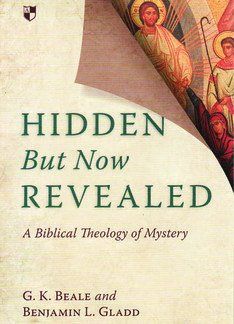Greg Beale of Westminster Seminary, Philadelphia, has a reputation for fine exegetical studies and rigorous defence of biblical inerrancy. He co-authors this detailed piece of theology with Benjamin Gladd of Reformed Seminary, Jackson.
The theme of ‘mystery’ in the New Testament has retained the interest of biblical scholars, with the rising influence of Geerhardus Vos. Richard Gaffin recently wrote that the aspect of mystery in the central doctrine of union with Christ is best understood in the redemptive historical perspective.
This work is a useful contribution to the theme and may lay claim to being the first extensive treatment of the subject. It is not, however, a book for the uninitiated or faint-hearted, even if it is attractively written with illustrative charts.
Starting with two chapters on ‘mystery’ in Daniel and early Judaism, the term is examined in the eight NT books where it is used. It is then analysed in passages where the meaning is present, even if not the word itself. This leads to a chapter contrasting the Christian mystery with pagan mystery religions. A conclusion follows.
The background in Daniel shows that revelation of a mystery ‘can be defined roughly as God fully disclosing wisdom about end-time events that were mostly hitherto unknown (Daniel 2:20-23)’ (p.43). When the promised Saviour appears, the mystery of the kingdom and the hidden glory of the suffering and all-powerful Messiah unfolds.
While appreciating the excellence of this detailed biblical work, my theological questions start where the book leaves off. This seems to be the case with a good many exegetical and biblical studies I come across. It is a sad witness to the cloistering that exists in the academic world between biblical work and practical concerns.
How does the mystery of the NT contrast with the hopes and fears of our contemporaries in this post-nuclear, post-9/11, apocalyptic global village we inhabit? How does it speak in that context?
How does the biblical mystery correlate with the purposes of an all-wise and all-rational God, so that the mystery itself is not irrational, but totally rational and believable? In what way is the biblical mystery different from the science-fiction irrationality that is so attractive to many of our contemporaries?
Although there is a brief section on ‘cruciform lifestyle’, how does the biblical mystery impact on my day-to-day expectations and fears of the future? These considerations are obviously not criticisms of the work itself, but, rather like Oliver Twist, I want more.
Paul Wells
Eastbourne




